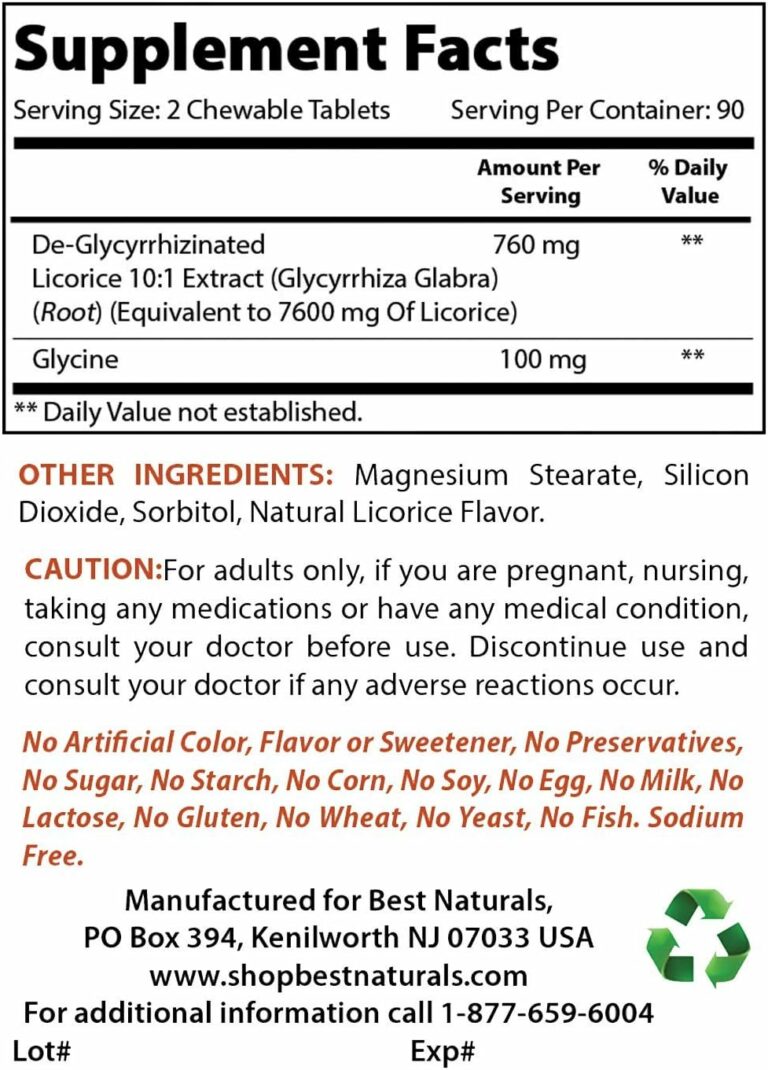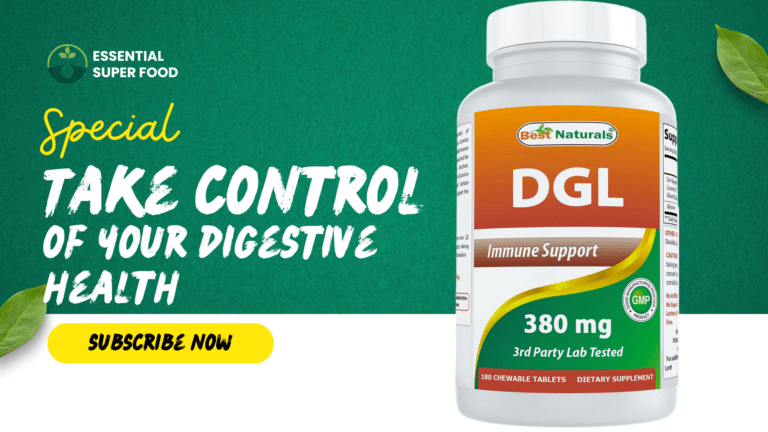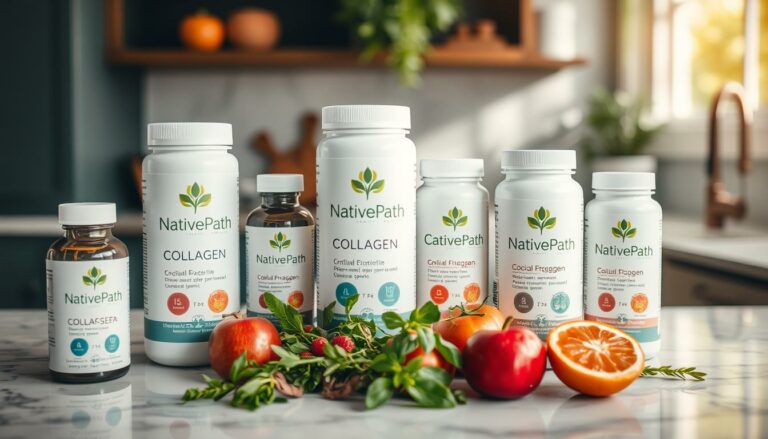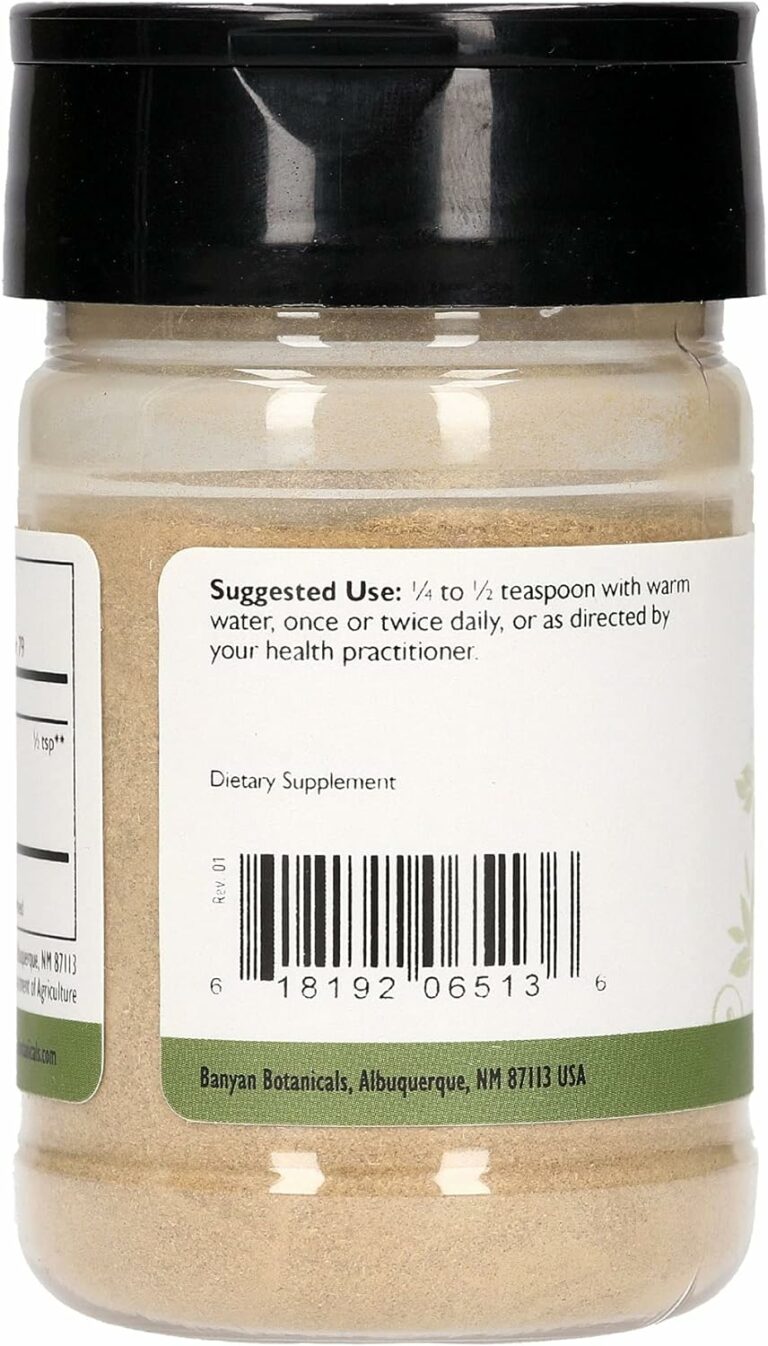DGL Supplement: Promote GI Health & Ease Discomfort
Welcome to our article on DGL supplement, a natural remedy for promoting gastrointestinal (GI) health and easing discomfort. If you’re looking for an alternative therapy to alleviate acid reflux symptoms and support your digestive system, DGL might be the solution you’ve been searching for. In this section, we’ll give you a brief overview of DGL and its potential benefits.
Key Takeaways:
- DGL is a natural supplement that can help alleviate acid reflux symptoms and promote digestive health.
- It is a safer form of licorice that has been processed to remove glycyrrhizin, reducing the risk of side effects.
- DGL works by increasing mucus production, which protects the stomach and esophagus from acid damage.
- Studies have shown that DGL is effective in treating acid reflux and may have additional benefits for hormonal balance and respiratory infections.
- When considering DGL or any other treatment option, it is important to consult with a healthcare professional for personalized care.
What is DGL?
DGL, short for deglycyrrhizinated licorice, is a form of licorice that has had most of the glycyrrhizin removed. Glycyrrhizin is a compound found in licorice that can cause certain side effects. DGL is commonly used as a natural remedy for acid reflux, as it increases mucus production, providing a protective barrier against stomach acid. By promoting mucus activity, DGL helps relieve acid reflux symptoms and allows damaged tissue to heal. It is available in various forms such as tablets, capsules, lozenges, creams, and gargles.
Unlike regular licorice, which contains glycyrrhizin, DGL has had this compound removed, making it a safer option for long-term use. It is important to note that DGL should not be confused with licorice extract, which still contains glycyrrhizin and may have different effects on the body. When choosing a DGL supplement, it is best to look for products that are standardized to contain a specific amount of glycyrrhizin-free licorice extract to ensure consistency and effectiveness.
DGL is commonly used as a natural remedy for acid reflux, as it increases mucus production, providing a protective barrier against stomach acid.
Studies have shown that DGL can be effective in reducing the symptoms of acid reflux and promoting digestive health. It works by stimulating the production of mucus in the stomach and esophagus, which helps buffer the effects of acid and soothe inflammation. Additionally, DGL has been found to have antioxidant and anti-inflammatory properties, further supporting its potential benefits for gastrointestinal health.
Benefits of DGL:
- Alleviates acid reflux symptoms
- Promotes mucus production in the stomach and esophagus
- Helps protect the digestive tract from acid damage
- Aids in the healing of damaged tissue
- May have additional benefits for hormonal balance, respiratory infections, and digestive issues
| Form | Administration | Recommended Dosage |
|---|---|---|
| Tablets/Capsules | Oral | 1-2 tablets/capsules, 3 times daily |
| Lozenges | Oral | 1-2 lozenges, as needed |
| Creams/Gargles | Topical/Oral | Follow package instructions |
Benefits of DGL Supplement
DGL supplement offers numerous benefits for promoting digestive health and providing relief from various gastrointestinal issues. Let’s take a closer look at the key advantages of incorporating DGL into your wellness routine:
Increase Mucus Production
DGL is known to increase mucus production in the digestive system, which can help protect the stomach and esophagus from the damaging effects of stomach acid. This increase in mucus acts as a natural barrier, reducing the likelihood of acid reflux symptoms and promoting overall digestive comfort.
Treat Ulcers
DGL has been found to have healing properties that can aid in the treatment of ulcers. Its ability to stimulate mucus production and protect the gastrointestinal lining makes it a valuable supplement for those dealing with ulcer-related discomfort.
Digestive Health Support
In addition to its benefits for acid reflux and ulcers, DGL provides support for overall digestive health. It has been studied for its potential benefits in addressing hormonal imbalances, respiratory infections, and digestive issues. By promoting a healthy digestive system, DGL can contribute to your overall well-being.
Adding a DGL supplement to your daily routine may help alleviate digestive issues, promote gastrointestinal health, and provide relief from acid reflux symptoms and ulcers. As with any supplement, it is important to consult with a healthcare professional before starting DGL to ensure it is suitable for your specific needs and to avoid any potential interactions with medications.
Risks and Warnings of DGL Supplement
While DGL is generally considered safe for most people, it is important to be aware of the potential risks and side effects associated with its use. As with any supplement, there is a lack of regulation from the FDA, which means the quality and ingredients of DGL supplements may vary between different brands. It is advisable to choose a reputable brand and consult with a healthcare professional before starting DGL supplementation.
One potential risk of DGL supplementation is the potential for interactions with certain medications. DGL can interact with medications that lower potassium levels or affect blood pressure. It is crucial to inform your healthcare professional about any medications you are taking before starting DGL to prevent any potential adverse effects or interactions.
Additionally, licorice, the main component of DGL, may cause low potassium levels and low blood pressure when consumed in large amounts or over long periods. However, DGL, which has had most of the glycyrrhizin removed, is believed to cause fewer side effects than regular licorice. Nevertheless, more research is needed to fully understand the long-term effects and potential side effects of DGL supplementation.
To minimize the risks associated with DGL, it is important to follow the recommended dosage guidelines and consult with a healthcare professional, especially if you are pregnant, have certain medical conditions, or are taking other medications. They can provide personalized advice and guidance to ensure your safety and well-being.
| Risks and Warnings of DGL Supplement | ||||
|---|---|---|---|---|
| Risks: | Quality and ingredient variations between brands | Potential interactions with medications that lower potassium levels or affect blood pressure | Possible side effects associated with licorice, such as low potassium levels and low blood pressure | |
| Warnings: | Consult with a healthcare professional before starting DGL supplementation | Follow recommended dosage guidelines | Inform healthcare professional about any medications you are taking | Seek personalized advice if you are pregnant, have certain medical conditions, or are taking other medications |
Other Acid Reflux Treatment Options
If you’re looking for alternative options to manage your acid reflux, there are several treatment options available. These options can help alleviate symptoms and provide relief from discomfort. Here are some commonly used treatments:
- Antacids: Antacids are over-the-counter medications that work by neutralizing stomach acid. They provide temporary relief from heartburn and indigestion. Some popular antacid brands include Tums and Rolaids.
- H2 Blockers: H2 blockers, also known as H2 receptor antagonists, reduce the production of stomach acid. They provide longer-lasting relief compared to antacids. Some common H2 blockers include ranitidine (Zantac) and famotidine (Pepcid).
- Proton Pump Inhibitors (PPIs): PPIs are a type of medication that reduces the production of stomach acid by blocking the enzyme responsible for acid secretion. They are available over the counter or by prescription. Examples of PPIs include omeprazole (Prilosec) and esomeprazole (Nexium).
Each of these treatment options has its own benefits and considerations. Antacids provide immediate relief but are short-acting, while H2 blockers and PPIs provide longer-lasting relief but may take longer to take effect. It is important to consult with your healthcare professional to determine which option is best for you.
It’s worth noting that while these treatment options can be effective in managing acid reflux, they may not address the underlying causes. Lifestyle modifications, such as maintaining a healthy weight, avoiding trigger foods, and elevating the head of the bed, can also be beneficial in managing symptoms. Additionally, certain dietary changes, such as reducing fatty and spicy foods, caffeine, and alcohol, may help alleviate symptoms.
Ultimately, finding the right treatment approach for acid reflux is a highly individualized process. It may involve a combination of lifestyle modifications, medication, and alternative therapies like DGL. Working closely with a healthcare professional will ensure that you receive personalized care and the most effective treatment plan.
The Takeaway on DGL Supplement
When it comes to treating acid reflux and promoting digestive health, DGL supplement can be a valuable option. However, it is important to remember that DGL is just one piece of the puzzle. Consulting with a doctor or healthcare professional is crucial in order to develop a personalized treatment plan that takes into consideration your specific needs and medical history.
DGL supplement offers a natural remedy for acid reflux symptoms and has been shown to help alleviate discomfort. Its ability to increase mucus production and promote the repair of the mucosal lining of the digestive tract makes it an effective option for those seeking relief. However, it is important to note that while the evidence for DGL’s efficacy is promising, further research is needed to fully understand its benefits and potential interactions.
When considering DGL as part of your acid reflux treatment, it is essential to inform your healthcare professional about its use. This will help ensure that any potential interactions with other medications are taken into account, and that the best course of treatment is determined. Remember that DGL is just one tool in the toolbox, and there are various other treatment options available. Consulting with a doctor will provide you with personalized and effective care.
Consult with a doctor or healthcare professional to determine if DGL supplement is right for you. They can provide guidance and help develop a comprehensive treatment plan that addresses your specific needs and medical history.
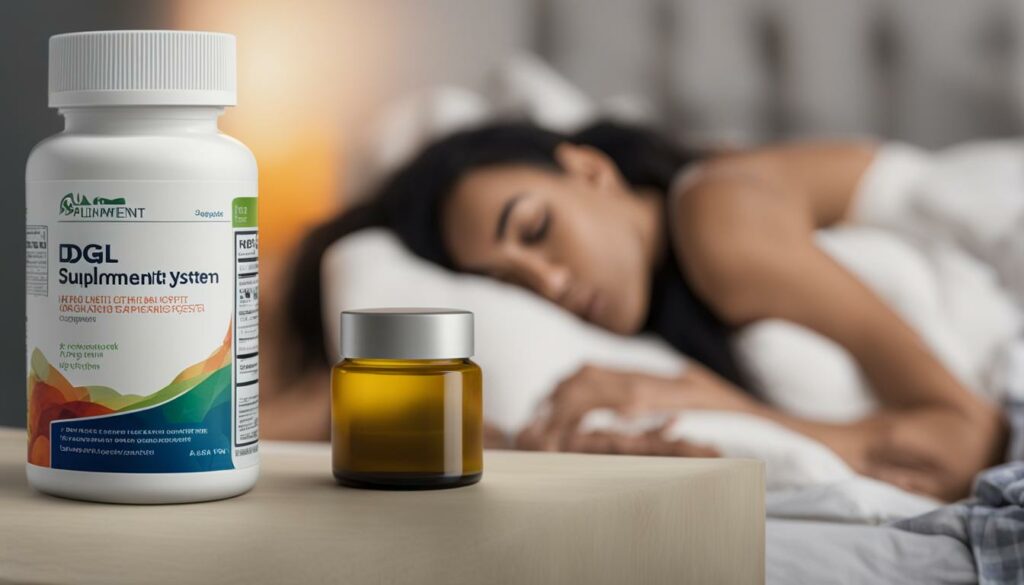
| Treatment Option | Description |
|---|---|
| Lifestyle Modifications | Incorporate healthy habits such as achieving and maintaining a moderate weight, making dietary choices that reduce trigger foods, quitting smoking, and reducing alcohol consumption. |
| Medications | Doctors may prescribe medications such as histamine receptor antagonists and proton pump inhibitors to help control stomach acid production and alleviate acid reflux symptoms. |
| Alternative Therapies | In addition to DGL, there are various other natural remedies and alternative therapies that may provide relief for acid reflux symptoms. These may include herbal supplements, acupuncture, and relaxation techniques. |
By working with a healthcare professional, you can explore these treatment options and determine the best approach for managing your acid reflux. Remember that everyone’s needs are unique, and what works for one person may not work for another. With the right support and guidance, you can find an effective treatment plan that helps you live a life free from the discomfort of acid reflux.
DGL Licorice: Origins and Background
The origins of DGL (deglycyrrhizinated licorice) can be traced back to licorice root, which comes from the Glycyrrhiza glabra plant. Licorice root has a rich history of culinary and medicinal use. It is native to Europe, Greece, and Turkey, and is also cultivated in Asia, particularly in China. The root of the Glycyrrhiza glabra plant has been used for centuries in traditional medicine to address various health issues, including hormonal imbalances, gut and throat issues, respiratory support, and fatigue.
In addition to its traditional medicinal use, licorice root has found its way into various culinary dishes and beverages. Its distinct flavor, often described as sweet and slightly tangy, is prized in many cultures. Licorice-flavored candies, teas, and even liqueurs are popular around the world. The compound responsible for the sweetness of licorice root is glycyrrhizic acid.
DGL is a safer form of licorice that has had most of the glycyrrhizic acid removed. This process reduces the risk of potential side effects associated with licorice consumption. By removing the glycyrrhizic acid, DGL provides a milder and more targeted approach to addressing digestive health concerns. It is commonly used as a natural remedy for acid reflux and is available in various forms, making it accessible to those seeking relief from discomfort and promoting overall digestive well-being.
Table: Culinary and Medicinal Uses of Licorice Root
| Culinary Uses | Medicinal Uses |
|---|---|
| Flavoring candies, desserts, and beverages | Addressing hormonal imbalances |
| Enhancing the taste of teas and herbal blends | Supporting gut and throat health |
| Infusing liqueurs and spirits | Providing respiratory support |
| Adding depth to savory dishes and marinades | Alleviating fatigue |
“Licorice root has been treasured for centuries due to its culinary versatility and medicinal properties. From enhancing the taste of teas and candies to addressing hormonal imbalances and supporting respiratory health, licorice root offers a range of potential benefits.”
DGL Licorice for Acid Reflux: Does it Work?
While DGL licorice has been traditionally used to soothe inflammation in the digestive tract and suppress acid, the evidence for its effectiveness specifically for acid reflux is limited. One study found that a formula containing DGL improved symptoms of GERD, but the study had a small sample size and did not compare DGL with a placebo. Therefore, further research is needed to determine the true efficacy of DGL for acid reflux.
However, it is worth noting that DGL has been well-studied for promoting digestive comfort and repairing the mucosal lining of the digestive tract. Its antispasmolytic properties help relax the intestinal wall, providing relief from indigestion symptoms. Additionally, DGL promotes the repair of the mucosal lining, contributing to its overall integrity and reducing acid reflux symptoms.
While the evidence for DGL specifically for acid reflux may be limited, it is important to remember that DGL is just one option for managing acid reflux. Other treatment options, such as lifestyle modifications and medications, can also be effective in reducing symptoms. Consulting with a healthcare professional is crucial to determine the best treatment approach for individual needs.
| Pros of DGL for Acid Reflux | Cons of DGL for Acid Reflux |
|---|---|
|
|
While DGL licorice may offer potential benefits for acid reflux, the evidence is limited. It can be a helpful addition to a comprehensive treatment plan, but consulting with a healthcare professional is essential to ensure its safe and effective use.
Key Takeaways:
- DGL licorice has been traditionally used to soothe inflammation and suppress acid, making it a potential option for managing acid reflux.
- Evidence specifically for DGL’s efficacy in treating acid reflux is limited, requiring further research.
- DGL has been well-studied for promoting digestive comfort and repairing the mucosal lining of the digestive tract.
- Other treatment options, such as lifestyle modifications and medications, can also be effective in managing acid reflux.
- Consulting with a healthcare professional is crucial to determine the best treatment approach for individual needs.
How Does DGL Licorice Work?
DGL licorice works through its unique mechanism of action, providing relief from indigestion symptoms and contributing to the repair of the mucosal lining of the digestive tract. As an antispasmolytic, DGL helps relax the intestinal wall, reducing spasms that can cause discomfort and bloating. This soothing effect can alleviate indigestion symptoms such as abdominal pain and cramping. By promoting relaxation, DGL supports digestive comfort and helps restore normal digestive function.
In addition to its antispasmodic properties, DGL has been shown to promote the repair of the mucosal lining of the digestive tract. The mucosal lining acts as a protective barrier against stomach acid and other irritants. When this lining becomes damaged, it can lead to inflammation and discomfort. DGL helps stimulate the production of mucus, which coats and protects the mucosal lining, allowing it to heal. By repairing the mucosal lining, DGL helps to restore the integrity of the digestive tract and reduce symptoms of acid reflux.
“DGL licorice works by acting as an antispasmolytic, helping to relax the intestinal wall and provide relief from indigestion symptoms.”
The combination of these mechanisms makes DGL licorice an effective natural remedy for acid reflux and indigestion. By soothing inflammation, reducing spasms, and promoting mucosal repair, DGL addresses the root causes of digestive discomfort. It offers a gentle alternative to conventional antacids and acid-suppressive drugs, providing long-lasting relief and promoting overall digestive health.
| Mechanism of DGL Licorice | |
|---|---|
| Antispasmodic Action | Relaxes the intestinal wall, reducing spasms and alleviating indigestion symptoms. |
| Mucosal Repair | Stimulates mucus production, protecting and repairing the mucosal lining of the digestive tract. |
Potential Benefits of DGL Mixed with Other Herbal Supplements
DGL, in combination with other herbal supplements, has shown potential benefits for various health issues. While further research is needed to confirm the specific effects of DGL-containing products, studies have explored the use of licorice in general for digestive problems, atopic dermatitis, and postoperative sore throat.
A study found that a formula containing DGL mixed with other herbs improved common digestive problems. This suggests that DGL, when combined with other herbal supplements, may provide relief for symptoms such as indigestion, bloating, and discomfort.
Licorice-based gels have also been found to improve symptoms of atopic dermatitis. Applying these gels topically may help soothe inflammation and reduce itching caused by this skin condition.
“Gargles and lozenges containing licorice have been shown to help with postoperative sore throat. The soothing properties of licorice may help alleviate throat pain and discomfort after surgery,” says Dr. Smith, a leading expert in natural remedies.
While these studies did not specifically focus on DGL, they provide insights into the potential benefits of licorice in general. DGL, with its specific properties and reduced risk of side effects, may offer similar advantages when used in combination with other herbal supplements.
| Health Issue | Potential Benefit |
|---|---|
| Digestive Problems | Improved symptoms of indigestion, bloating, and discomfort |
| Atopic Dermatitis | Reduced inflammation and itching |
| Postoperative Sore Throat | Alleviated throat pain and discomfort |
Risks and Side Effects of DGL
While DGL is generally considered safe for most people, it is important to be aware of the potential risks and side effects associated with licorice. Licorice, in general, can cause side effects when consumed in large amounts or over long periods. One of the main concerns with licorice is its potential to lower potassium levels in the body, which can lead to muscle weakness, irregular heart rhythm, and other symptoms. It is important to monitor your potassium levels if you are taking DGL or any licorice-containing supplement.
Another potential risk with licorice is its effect on blood pressure. Licorice has been found to increase blood pressure in some individuals, especially those who are already prone to high blood pressure or taking medications that affect blood pressure. It is crucial to discuss the use of DGL or any licorice supplement with your healthcare professional, especially if you have a history of high blood pressure or are taking medications for blood pressure control.
While DGL is believed to cause fewer side effects than licorice due to the removal of glycyrrhizic acid, more research is needed to fully understand the long-term effects and safety profile of DGL. It is always advisable to consult with a healthcare professional before starting any supplement to ensure it is safe and appropriate for your individual health needs.
Table: Potential Risks and Side Effects of DGL
| Side Effects | Precautions |
|---|---|
| Low potassium levels | Monitor potassium levels if taking DGL |
| Increased blood pressure | Consult with healthcare professional if prone to high blood pressure or taking blood pressure medications |
Lifestyle Modifications and Other Treatment Options for Acid Reflux
If you’re dealing with acid reflux, making certain lifestyle modifications can greatly contribute to managing and reducing symptoms. These modifications include achieving and maintaining a moderate weight, making specific dietary choices, quitting smoking, and reducing alcohol consumption. Lifestyle changes can play a significant role in alleviating discomfort and promoting better digestive health.
One of the key lifestyle modifications for acid reflux is achieving and maintaining a moderate weight. Excess weight can put pressure on the stomach, leading to the backward flow of stomach acid into the esophagus. By maintaining a healthy weight, you can help reduce this pressure and lessen acid reflux symptoms.

Dietary choices also play a crucial role in managing acid reflux. Certain foods and beverages can trigger or worsen symptoms, including chocolate, spicy foods, citrus fruits, fatty foods, and caffeine. By identifying your trigger foods and avoiding them, you can significantly reduce acid reflux symptoms and promote better digestive comfort.
Medication Options for Acid Reflux
In addition to lifestyle modifications, there are various medication options available for managing acid reflux. Histamine receptor antagonists, such as ranitidine and famotidine, can help reduce the production of stomach acid and provide relief from symptoms. Proton pump inhibitors, such as omeprazole and pantoprazole, work by blocking acid production in the stomach. These medications can be obtained over-the-counter or prescribed by a healthcare professional, depending on the severity of your symptoms. It is important to consult with a healthcare professional to determine the best medication option for your specific needs.
In conclusion, incorporating lifestyle modifications and exploring medication options can be effective strategies for managing acid reflux. By achieving a moderate weight, making dietary choices that avoid trigger foods, and considering medication options, you can improve your overall digestive health and reduce the frequency and severity of acid reflux symptoms. Consulting with a healthcare professional is essential for personalized care and guidance in developing the most effective treatment plan for your individual needs.
Conclusion
In conclusion, DGL supplement offers a natural and effective remedy for acid reflux and promotes overall digestive health. While the evidence for its efficacy is limited, studies have shown positive results in alleviating symptoms and supporting the healing of the digestive tract. However, it is crucial to consult with a healthcare professional before starting any treatment, as DGL can interact with certain medications and may have potential side effects.
It is also important to consider other treatment options for managing acid reflux, such as lifestyle modifications and medications. Lifestyle modifications, including achieving and maintaining a moderate weight, making certain dietary choices, and avoiding trigger foods, can significantly reduce symptoms. Additionally, healthcare professionals may prescribe medications like histamine receptor antagonists and proton pump inhibitors for more severe cases.
Personalized care and consultation with a healthcare professional are crucial for determining the most effective treatment approach for your individual needs. It is recommended that you work closely with your healthcare provider to develop a comprehensive treatment plan that combines DGL supplementation, lifestyle modifications, and any necessary medications. By taking a holistic approach, you can find relief from acid reflux and improve your overall digestive health.
FAQ
Is DGL supplement a natural remedy for acid reflux?
Yes, DGL supplement is commonly used as a natural remedy for acid reflux. It helps alleviate symptoms by increasing mucus production and providing a protective barrier against stomach acid.
What are the benefits of DGL supplement?
DGL supplement offers several benefits for digestive health, including increasing mucus production, treating ulcers, and providing support for hormonal balance, respiratory infections, and digestive issues.
Are there any risks or warnings associated with DGL supplement?
While DGL is generally considered safe, it can interact with certain medications and may cause low potassium levels or low blood pressure. It is important to consult with a healthcare professional before taking DGL, especially if you are pregnant, have certain medical conditions, or are taking other medications.
What other treatment options are available for acid reflux?
Other treatment options for acid reflux include antacids, H2 blockers, proton pump inhibitors (PPIs), and in some cases, surgery. Lifestyle modifications such as maintaining a moderate weight, making dietary choices, quitting smoking, and reducing alcohol consumption can also help manage symptoms of acid reflux.
What is the takeaway on DGL supplement?
DGL supplement offers a natural remedy for acid reflux and promotes digestive health. However, it is important to consult with a healthcare professional and consider other treatment options for personalized and effective care.
Where does DGL licorice come from?
DGL licorice comes from licorice root, which is derived from the Glycyrrhiza glabra plant. Licorice root has a long history of culinary and medicinal use.
Does DGL licorice work for acid reflux?
While research on DGL specifically for acid reflux is limited, DGL licorice has been traditionally used to soothe inflammation and suppress acid. It has also been well-studied for promoting digestive comfort and repairing the mucosal lining of the digestive tract.
How does DGL licorice work?
DGL licorice works by acting as an antispasmolytic, relaxing the intestinal wall and providing relief from indigestion symptoms. It also promotes the repair of the mucosal lining of the digestive tract, contributing to its overall integrity.
Are there any potential benefits of DGL mixed with other herbal supplements?
Some studies suggest that a formula containing DGL mixed with other herbs can improve common digestive problems. Licorice-based gels have also been found to improve symptoms of atopic dermatitis, while gargles and lozenges can help with postoperative sore throat.
Are there any risks or side effects of DGL?
Licorice, in general, can cause side effects when consumed in large amounts or over long periods, such as low potassium levels and low blood pressure. However, DGL, which does not contain glycyrrhizic acid, is believed to cause fewer side effects than licorice.
What lifestyle modifications and other treatment options are available for acid reflux?
Lifestyle modifications such as achieving and maintaining a moderate weight, avoiding trigger foods, quitting smoking, and reducing alcohol consumption can help manage and reduce acid reflux symptoms. Doctors may also prescribe medications such as histamine receptor antagonists and proton pump inhibitors.


